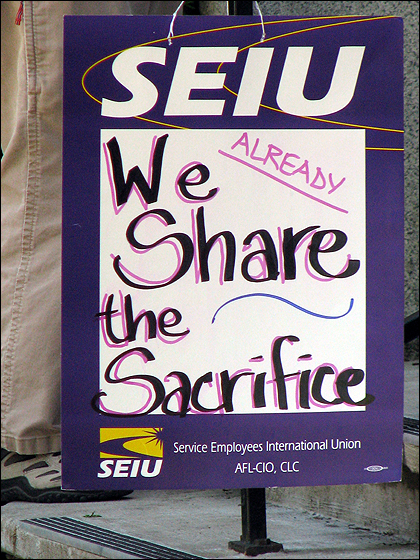
Time for a Talk
Public workers reach out to community
By John Davis
The relationship between public sector workers and the community has frayed in many places, and broken down completely in others. By relationship, I refer to the sort of thing you experience with a long-term partner, because thats what public workers and the community are to one another.
 |
Eugene Springfield Solidarity Network (ESSN) is hosting a community conversation between public workers and the citizens they serve, from 6:30 to 8:30 pm Wednesday, July 13, at St. Marys Catholic Church, 1062 Charnelton. Eugenes public employees would like to spend an evening with you, the community, and have a very important talk. You see, weve noticed that far-off look in your eyes for a while now, and we realize that something serious is wrong with our relationship. Weve been less than stellar at communicating, and you might feel that you havent been heard.
We think that the relationship between public employees and our community has a strong solid foundation. But weve let the communication piece slide, as partners often do when there is much to be done at work and around the house. But if youll join us July 13, wed like to talk about our role in the life of the community. This relationship has worked for a long time, and theres no reason it shouldnt continue, if we can be sure to listen and respond with regard to one anothers needs.
It is the public that will ultimately decide the fate of public employees, just as it has in the civil rights movement and the anti-war movement. Unfortunately, public workers have allowed themselves to be defined by their detractors in recent years. According to them, Ronald Reagans “welfare queen” has apparently found work in civil service. But such voices will always exist, and our best defense is to ignore them in favor of engaging in a real conversation with the community. Eugene is a precious place, even unique. Here, and in other communities that people love, public workers can best justify their existence by saying, “Take a look around.”
Imagine looking at our community on Google maps. Get close enough to recognize the places you go regularly, or that you pass by. Now go to the “layers” button. (For those who dont know, the layers feature allows you to overlay specific kinds of locations ã restaurants, parks, crime scenes, or what have you ã on to your map.)
Click on only the layers that you want in your community: good public schools, parks, police patrols, fire stations, in-home health care, bike paths, universities, community colleges, hospitals, reliable electricity, clean drinking water, storm water and sewage maintenance, roads and bridges, a stable middle class. How many of those layers did you click?
Much of what makes Eugene terrific has some connection to the people who serve our community, and who are proud members of unions. Events like the Olympic Trials at Hayward Field, football games at Autzen Stadium or Wicked at the Hult Center rely upon public employees to create and maintain the necessary computer and technological requirements for the events or to provide all the conditions necessary for a world-class experience. These events enrich the culture and the economy in our community and they are supported in large part by hundreds of rank and file public employees.
As our economy stumbles headlong into tomorrow, should our societys workforce seek the shelter and promise of organized labor, or should we keep clear of its tottering shadow? While union membership has steadily declined in the private sector ã along with private sector wages, benefits, and security ã organized public workers remain. Public employee unions are like an atoll, offering shelter despite the violent collapse of the original island. But like the atolls used for weapons-testing in the 1950s, public employees have been labeled as useless fossils in the modern age.
Public workers are public servants, and wed like to have a talk with the public about how to improve our relationship.
John Davis is a public school teacher of 10 years, and a representative for his school to the Eugene Education Association.